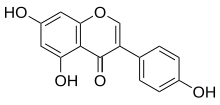genistein
Appearance
English
[edit]
Etymology
[edit]From translingual Genista + -ein.
Pronunciation
[edit]Noun
[edit]genistein (uncountable)
- (biochemistry) A pale yellow isoflavone derivative C15H10O5 originally obtained from dyer's broom (Genista tinctoria) and also present as a glycoside in soybeans and other leguminous plants, which has antioxidant, estrogenic, and other physiological effects in humans and animals.
- 2004, Mepur H. Ravindranath, Sakunthala Muthugounder, Naftali Presser, Subramanian Viswanathan, "Anticancer Therapeutic Potential of Soy Isoflavone, Genistein", Edwin Lowell Cooper, Nobuo Yamaguchi (editors), Complementary and Alternative Approaches to Biomedicine, Advances in Experimental Medicine and Biology, Volume 546, page 121,
- Genistein (4'5, 7-trihydroxyisoflavone) occurs as a glycoside (genistin) in the plant family Leguminosae, which includes the soybean (Glycine max).
- 2008, Audrey King Batoon, Prevention of Genomic Instability by the Dietary Antimutagens Genistein and Lycopene, PhD thesis, page 163,
- Dietarily-relevant, low micromolar concentrations of genistein and lycopene were found to be effective mitigators against the genomic instability present in the MCF-7, MDA-MB-468, and BT-474 breast cancer cells.
- 2012, Y. Wu, H.-D. Chen, Y.-H. Li, X.-H. Gao, V. R. Preedy, 5: Antioxidants and skin: an overview, Victor R. Preedy (editor), Handbook of Diet, Nutrition and the Skin, page 85,
- Isoflavones, such as genistein and daidzein, are one main group of phytoestrogens.
- 2004, Mepur H. Ravindranath, Sakunthala Muthugounder, Naftali Presser, Subramanian Viswanathan, "Anticancer Therapeutic Potential of Soy Isoflavone, Genistein", Edwin Lowell Cooper, Nobuo Yamaguchi (editors), Complementary and Alternative Approaches to Biomedicine, Advances in Experimental Medicine and Biology, Volume 546, page 121,
Related terms
[edit]Translations
[edit]Translations
|
References
[edit]- “genistein”, in Lexico, Dictionary.com; Oxford University Press, 2019–2022.
- “genistein”, in Merriam-Webster Online Dictionary, Springfield, Mass.: Merriam-Webster, 1996–present.

